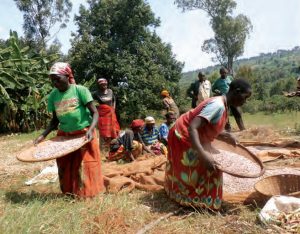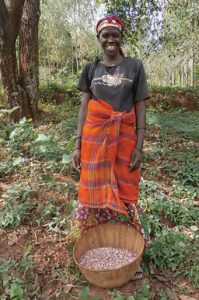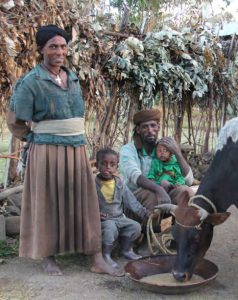The Startling Link Between Conservation and Hunger
Creation, Creation CareContributed by: Food for the Hungry Canada
Originally published on fh.org
795 million people globally don’t have enough to eat – one in nine people worldwide, most in developing countries.
That’s not OK.
And you can make a difference.
Can we end poverty by conserving earth’s precious resources?
The question isn’t as far-fetched as it sounds. With over 40 years working with the world’s hardest places, we at Food for the Hungry have seen a startling link between the way we care for God’s creation and the chances of a family breaking out of poverty.
We’ve discovered that when you care for God’s creation, you care for God’s people.
Farming God’s Way Replenishes Worn Out Soil


Uwimana Marie Laetitia, a 38-year-old mother of four from the African nation of Burundi, and her husband Bucangenda Serges struggled every year to get even 30 kg (66 pounds) of beans from their one acre lot.
After participating in Food for the Hungry’s farming lessons, Uwimana learned the “Farming God’s Way” technique. This approach maintains soil fertility by avoiding over digging, using appropriate fertilizers and organic manure and covering the soil with mulch to protect its biodiversity.
Using this method of caring for the land God has placed in their care, Uwimana and Bucangenda have increased production over seven times!
“God has opened a way for me to improve the wellbeing of my family,” Marie Laetitia said.
Once 38-year-old Uwimana Marie Laetitia began farming God’s way, her yields increased more than seven times, and her children’s health improved!
When we actively care for the environment by implementing sustainable conservation strategies, people are lifted out of poverty.
Anyone can make small, simple changes that make a HUGE difference for the world’s most vulnerable people.
Farming and local conservation techniques can make a difference in a local area, but there’s a bigger threat facing the world’s impoverished people – climate change and pollution.
783 million people don’t have enough clean water to drink. 6 to 8 million people die annually from the consequences of disasters and water related diseases.
Climate change isn’t a political issue. It’s a humanitarian issue… an environmental issue… a Christian issue.
Creation is “groaning.”
“For the creation was subjected to futility, not willingly, but because of him who subjected it, in hope that the creation itself will be set free from its bondage to corruption and obtain the freedom of the glory of the children of God. For we know that the whole creation has been groaning together in the pains of childbirth until now.” – Romans 8:20 – 22 ESV
Weather conditions across the globe are changing erratically.
These climatic changes make living in the hardest places on Earth even more difficult as rising sea levels contaminate fresh water, melting glaciers and ice caps diminish fresh water streams and storm systems become more destructive.
Additionally, you’ll be eager to share God’s joy with others. You may find yourself doing more kind and generous deeds throughout the year or praising God more. If you need a reminder of how God thinks of you, pray to be shown His joy. Then revel in it, because that will bring Him the most joy of all.
Warmer temperatures are causing drastic weather changes across the globe.
Atmospheric temperatures warmed roughly 1.53 degrees Fahrenheit between 1880 to 2012, according to the Intergovernmental Panel on Climate Change.
In the Northern Hemisphere, where most of Earth’s land mass is located, the three decades from 1983 to 2012 were likely the warmest 30-year period of the last 1,400 years, according to the IPCC.
The 1999–2002 national drought in America was one of the three most extensive droughts in the last 40 years.
Warming temperatures may have lead to the increased drought frequency that the North American West Coast has experienced over the last 30 years. Greater evaporation, particularly during summer and fall, could exacerbate drought conditions and increase the risk of wildfires.
Source: “Loving the Least of These” by the National Association of Evangelicals
As global temperatures steadily rise, erratic weather patterns increase and destroy the fragile resources the poor need to live.
Climate change is causing drought in Ethiopia.
The glaciers in the Athabasca Region of Ethiopia have been melting rapidly for a hundred years, when their borders were first measured, and the water is being lost to evaporation.
The entire region depends on glacier water to feed the rivers and water the fields. But the rivers have become streams that can barely sustain the local economy.
When we met Abere Gobeze, an Ethiopian farmer and father of four little ones, his half acre farm couldn’t feed the whole family year round due to lack of water for the crops. Abere and his family had to regularly rely on food and cash assistance to fill their food needs.
Food for the Hungry worked with Abere to dig and install a well to irrigate his crops.
The world’s most vulnerable people, like Abere, depend on the climactic patterns of the earth. For those of us in developed nations, these changes don’t dramatically affect our quality of life. But for the poor, it’s a different story.

“I prepared my backyard and planted different vegetables, tree seedlings and barley. The produce was very good! I harvested 400kg (882 pounds) of barley for household consumption. We sold vegetable and tree seedlings and earned about $400. With the money we bought a milking cow. Now my children get milk every day. I really thank those who supported me to build this water well.”
– Abere Gobeze
When Typhoon Haiyan raged across the Philippines in 2013 – the most violent storm to ever hit land in this part of the world – it was so devastating, it almost crippled the island nation.
Food for the Hungry was on the ground helping with the disaster relief efforts, but we’re continuing our disaster relief training efforts in the island nation.
Climate change is making developing countries like the Philippines vulnerable to even more powerful storms.
From 1901 through 2014, sea surface temperatures rose at an average rate of 0.13°F per decade. Warmer water in the oceans pumps more energy into tropical storms. The number of category 4 and 5 storms has greatly increased along with ocean temperature over the past 35 years.
The disaster residence training will help the people of the Philippines bounce back from these natural disasters caused by climate change.
You don’t have to be a millionaire to care for the poor… or save the planet.
Christians around the world can be a part of the solution with some simple changes of everyday habits.
Conserve resources – Turn off the water when brushing your teeth – Turn off the lights when leaving a room – Properly insulate homes so heating and cooling is efficient
Cut down on waste – Use recyclable containers instead of plastic bottles and bags – Recycle – Use fuel efficient or low emission vehicles
Grow organic vegetables – Build, fill and maintain a keyhole garden, which will produce nutrient-rich and drought-resistant veggies with less water – Compost your uncooked fruits and vegetable scraps to create fertilizer for your garden
Experience creation – If you can, walk or bike to work, friends’ houses or the store – Instead of watching TV, go rock climbing, or take a walk while watching the sun rise or set
It’s the simple decisions you make everyday that make all the difference for our planet… and the people in it.

